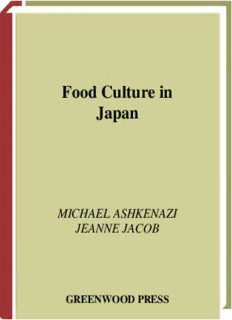
Food Culture in Japan (Food Culture around the World) PDF
Preview Food Culture in Japan (Food Culture around the World)
Food Culture in Japan MICHAEL ASHKENAZI JEANNE JACOB GREENWOOD PRESS Food Culture in Japan Cartography by Bookcomp, Inc. Food Culture in Japan MICHAEL ASHKENAZI AND JEANNE JACOB Food Culture around the World Ken Albala,Series Editor GREENWOOD PRESS . Westport,Connecticut London Library of Congress Cataloging-in-Publication Data Ashkenazi, Michael. Food culture in Japan / Michael Ashkenazi and Jeanne Jacob. p. cm. — (Food culture around the world, 1545–2638) Includes bibliographical references and index. ISBN 0–313–32438–7 (alk. paper) 1. Cookery, Japanese. 2. Food habits—Japan. I. Jacob, Jeanne. II. Title. III. Series. TX724.5.J3A88 2003 394.1(cid:1)0952—dc22 2003049317 British Library Cataloguing in Publication Data is available. Copyright © 2003 by Michael Ashkenazi and Jeanne Jacob All rights reserved. No portion of this book may be reproduced, by any process or technique, without the express written consent of the publisher. Library of Congress Catalog Card Number: 2003049317 ISBN: 0–313–32438–7 ISSN: 1545–2638 First published in 2003 Greenwood Press, 88 Post Road West, Westport, CT 06881 An imprint of Greenwood Publishing Group, Inc. www.greenwood.com Printed in the United States of America The paper used in this book complies with the Permanent Paper Standard issued by the National Information Standards Organization (Z39.48–1984). 10 9 8 7 6 5 4 3 2 1 Illustrations by J. Susan Cole Stone. The publisher has done its best to make sure the instructions and/or recipes in this book are correct. However, users should apply judgment and experience when preparing recipes, especially parents and teachers working with young people. The publisher ac- cepts no responsibility for the outcome of any recipe included in this volume. In memory of Okuyama Shunzô, friend, mentor, philosopher, and gourmet. Contents Preface ix Acknowledgments xv Timeline xvii 1. Historical Overview 1 2. MajorFoodsandIngredients 29 3. Cooking 91 4. TypicalMeals 117 5. Eating Out 127 6. Special Occasions: Holidays, Celebrations, and Religious Rituals 145 7. Diet and Health 169 Glossary 177 Resource Guide 187 Bibliography 193 Index 197 Preface For the average American diner, knowledge about and interest in Japa- nese food seemed to be confined to a few popular dishes until fairly recently. American exposure to Japanese food was largely limited to Japanese steakhouse chain offerings and deep-fried tempura. One primary ingredi- ent epitomized for the non-Japanese person Japanese food at its pinna- cle—raw fish. However, authentically prepared Japanese cuisine using raw fish as its centerpiece was for many years unavailable outside Japan. The ingredient itself was also a major barrier to undiluted worldwide acclaim of Japanese cuisine. To the uninitiated diner decades ago, sushi (raw fish and vinegared rice balls) or sashimi (raw fish slices) were breathtakingly aesthetic in concept and very visually tempting, but all interest stopped there. Those who did not wish to offend their hosts surreptitiously de- posited sashimi into a convenient paper napkin, or else swallowed it unchewed and washed it down with copious gulps of beer or saké. It does seem an injustice that for a very long time Japanese food did not receive the widespread recognition that it deserves. Many first-time eaters, though bowled over by its aesthetic presentation, describe Japa- nese food as insipid, because the subtlety of Japanese haute cuisine, as demonstrated in the kaiseki, or tea-ceremony, style of cooking, is lost on palates expecting elaborate blends of seasoning. Highly seasoned Chinese or intricately sauced French dishes are more likely to win over experi- menting palates. Palates have to be educated to fully appreciate Japanese food beyond the familiar stews, tempura(deep fried), and the lavishly sea- soned grilled dishes. Tongues have to learn to become sensitive to the
Description: